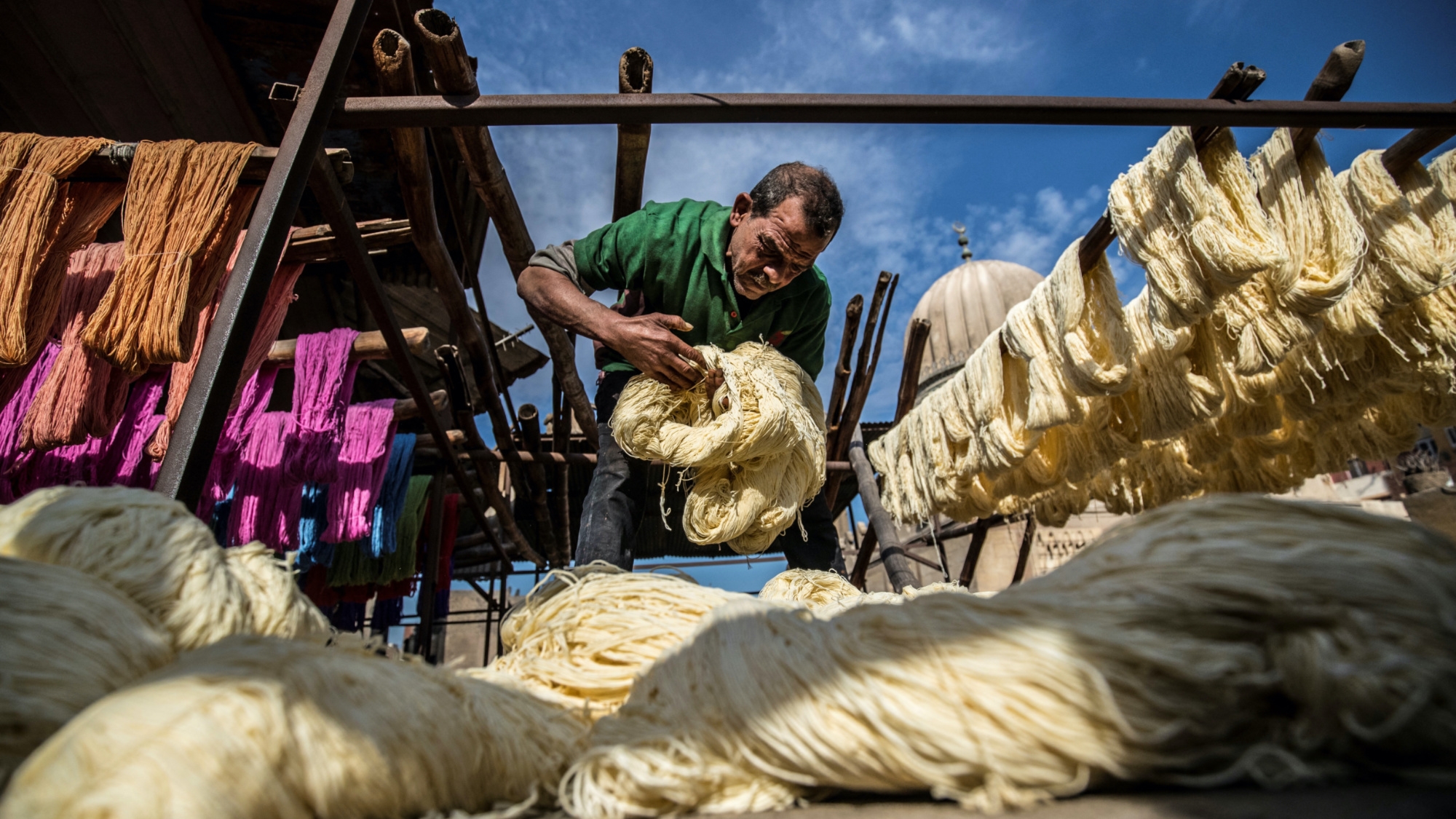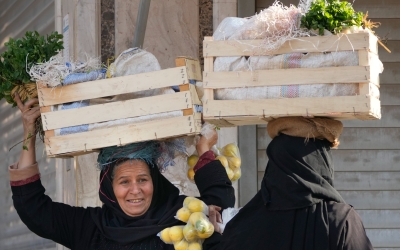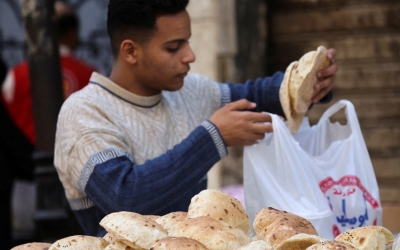Egyptian companies forced to 'do illegal things to stay in business'

A lack of foreign currency and tough banking requirements to finance imports is forcing many Egyptian manufacturers to engage in smuggling and illegal trade activity to stay afloat, manufacturers and analysts told Middle East Eye. With bogus export practices seemingly widespread, Egypt’s official trade figures may also be inflated.
For Egyptian businesses dependent on importing raw materials and machinery to manufacture goods it has been a turbulent past year.
The currency has devalued three times against the US dollar since March, losing half its value, while inflation has surged, reaching 22 percent in December.
"Due to inflation and the depreciation, our buying power is over 50 percent less than the start of last year," Gamal*, a Cairo-based garment and textile manufacturer, told Middle East Eye, using a pseudonym.
"It is difficult and expensive to import raw materials and close to impossible to import machinery, even if you have the money."
New MEE newsletter: Jerusalem Dispatch
Sign up to get the latest insights and analysis on Israel-Palestine, alongside Turkey Unpacked and other MEE newsletters
'A lot of people are doing this through the black market. There are all kinds of games going on, and everyone knows that'
- Egyptian economy analyst
The skies started to darken for manufacturers last February when Russia invaded Ukraine, which drove up the price of energy, caused delays in the supply chain, and created market uncertainty. Some $22bn was pulled out of the country’s debt market by foreign investors.
Then in March, Cairo depreciated the Egyptian pound to meet International Monetary Fund (IMF) requirements after Egypt sought a $3bn loan, its fourth in six years from the lender, to meet its growing debt obligations. The move drove up the cost of importation for businesses, particularly for firms that did not earn 50 percent or more of their earnings in foreign currencies from exports.
In May, domestic regulations imposed an additional burden when the Central Bank of Egypt required businesses to use foreign currency for letters of credit (LC) – a bank-issued document that guarantees payment upon delivery of goods or services – instead of dealing directly with international suppliers.
At the same time, the government increasingly restricted the amounts that foreign currency bureaus were allowed to exchange.
Dollar deposits at banks also started to dry up as account holders transferred their savings into Egyptian pounds to take advantage of local banks offering fixed-term savings certificates with interest rates of over 18 percent, and up to 25 percent as of January.
"A lot of people exchanged US dollar deposits for Egyptian pounds and then bought the certificates, so this has vacuumed foreign currency out of the local banking system,” said an Egyptian official off the record.
No choice but illegal
All of this left manufacturers who were more reliant on sales to the domestic market bereft of dollars and unable to acquire raw materials. This has had a major impact on Egypt’s garment and textile industry, which employs some 1.5 million people.
'The foreign exchange problem is affecting the market dramatically. A lot of local companies selling domestically are not working at more than 50 percent capacity due to the lack of currency and the difficulty of getting raw materials,” an industry player told trade publication World Textile Information Network in January.
To stay in business, manufacturers have had to resort to roundabout means to get goods and foreign currency.
"If manufacturers want to buy legally, it is impossible to get goods into the country. So buyers go on Facebook pages to find wholesalers selling containers of fabric. There’s lots of smuggling of fabric, yarn and other accessories," said Gamal.
More sophisticated techniques are being used to get dollars into company bank accounts, as under government regulations deposits have to be from direct exports.
"If you have say $100,000 you are unable to deposit in the bank, you need to change the money’s status into the proceeds of exports," said Gamal.
To do this, a manufacturer exports a container of low-quality goods to a friend who owns a business in another country, such as Dubai. The Egyptian manufacturer then transfers the desired amount to be repatriated as dollars to the "partner in crime", as Gamal put it, through a black market exchange dealer in Cairo.
"After the shipment and money is sent, you issue an invoice and your partner in crime deposits the money in their account and then makes a transfer to Egypt. You then have the money to pay for imports," said Gamal.
Companies are also genuinely exporting products to proper customers, he said, but over-invoice with the acquiescence of the buyer.
"This requires sending a large sum of money to the customer to cover the price difference," said Gamal. "We have no choice but to do illegal things to stay in business."
All kinds of games
In financial crime circles, such a practice is known as trade-based money laundering (TBML).
The Financial Action Task Force, a Paris-based body that sets international standards to prevent money laundering, defines TBML "as the process of disguising the proceeds of crime and moving value through the use of trade transactions in an attempt to legitimise their illicit origins. In practice, this can be achieved through the misrepresentation of the price, quantity or quality of imports or exports."
While Egyptian manufacturers are not using TBML to legalise proceeds of crime - the funds are their own - they are nonetheless using ways to get money into the financial system that is illegal under Egyptian law.
"A lot of people are doing this through the black market. There are all kinds of games going on, and everyone knows that," said a Cairo-based political-economy analyst who requested anonymity.
"You can basically pay foreign exchange dealers for whatever you want, but at a higher rate. There is a big financial incentive to do this, and if it is easy to do so through corrupt ways, everyone will do it instead of going out of business."
The financial costs of accessing dollars through such roundabout ways are taking their toll on businesses.
"There is only so much business you can do through these transfers, as it takes a lot of working capital," Gamal said.
"If you have X capital, you have to expand it by 1.5 or 1.8 times to move it out of the country and back in, as you lose on the goods sent, the black market rate to convert Egyptian pounds to dollars, and on the transfer.
"You also have to wait for the goods to be exported, and the transfers to happen."
Gamal said that the only other option that Egyptian businesses have is to get a bank loan, but with interests at around 18-20 percent, "it is not worth it".
"After the last devaluation, prices are crazy," he added, in reference to the pound's depreciation by 13 percent to a historic low of 32.20 to the dollar, from 27.60 at the open of trade, in January.
The elephant in the room
Smuggling and trade misinvoicing are distorting Egypt’s real import and export figures, with Gamal estimating that around half of garment and textile businesses, as well as other enterprises, are engaging in such illicit activity.
"You have to bear in mind that when the government is telling you in the news that they have increased export numbers by such and such a figure, this is probably due to the bogus exports," he said.
The analyst agreed.
"This does distort trade figures and produces misleading data. And poor data is part of Egypt’s economic problems. The government talks up the figures with a big propaganda campaign to make it sound positive, but if you look at the facts and the numbers it is a mess," he said.
"Egypt has been reduced to begging and is completely dependent on Gulf countries and international money (to meet its debt obligations) because of the complete failure of the regime’s economic model. No one is allowed to say this. It is the elephant in the room."
The foreign currency crunch may ease after close to $1bn flowed into Egypt the day after the January depreciation, while the government has also started clearing import backlogs at ports.
But such inflows "are nowhere near enough," said the analyst.
"Many companies are going out of business, and there is a big difference between the reality on the street versus what you see (on Egyptian) TV. There is still a flourishing black market, which shows ministers are lying and that we’ve not bottomed out. The problem remains a dollar shortage."
Middle East Eye delivers independent and unrivalled coverage and analysis of the Middle East, North Africa and beyond. To learn more about republishing this content and the associated fees, please fill out this form. More about MEE can be found here.






